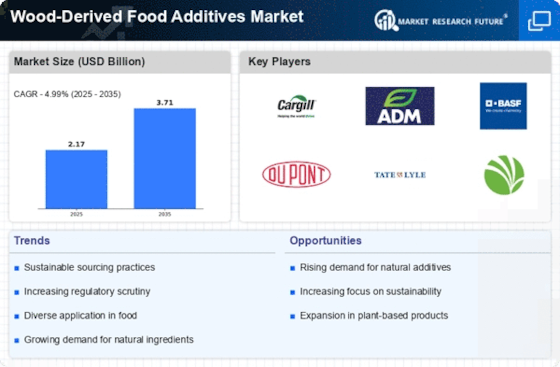Top Industry Leaders in the Wood-derived Food Additives market

The Competitive Landscape of the Wood-Derived Food Additives Market
The global wood-derived food additives market plays a significant role in providing functional ingredients for the food and beverage industry. Key players in this market are strategically positioning themselves to cater to the increasing demand for natural and sustainable food additives. This analysis offers a detailed examination of the competitive landscape, covering key players, strategies, market share factors, emerging companies, industry news, current investment trends, and a notable development in 2023.
Key Players:
BASF SE (Germany)
Cargill Inc. (U.S.)
Ingredient Incorporated (U.S.)
Archer-Daniels-Midland Company (U.S.)
I. du Pont de Nemours and Company (U.S.)
Evonik Industries AG (Germany)
Kerry Group Plc. (Ireland)
Tate & Lyle Plc. (U.K)
CP Kelco U.S., Inc. (U.S.)
Kerry Group Plc. (Ireland)
Strategies Adopted:
The wood-derived food additives market adopt various strategies to maintain and enhance their market positions. Strategies encompass sustainable sourcing practices, innovative product development, collaborations with food manufacturers, and a focus on addressing specific functional needs in food applications. For example, Fiberstar, Inc. has focused on research and development to create wood-derived food additives that enhance texture and stability in various food products. Strategic partnerships with food manufacturers have allowed the company to expand its market reach and offer tailored solutions to meet specific industry requirements.
Market Share Analysis:
Wood-derived food additives market involves evaluating multiple factors that impact competitive positioning. Key considerations include the functionality and versatility of the additives, regulatory compliance, pricing strategies, and the ability to cater to diverse food applications. Companies that effectively address these factors are better positioned to capture and retain a significant share of the market. Additionally, factors such as product consistency, supply chain transparency, and adherence to sustainability standards contribute to market differentiation and influence buyer choices.
News & Emerging Companies:
The wood-derived food additives market has witnessed the emergence of new and innovative companies, reflecting the industry's adaptability and potential for growth. In 2023, emerging players like Earth Supplied Products entered the market with unique wood-derived food additives, gaining attention for their focus on clean-label and natural solutions. These newcomers contribute to the market's diversity, challenging established players and fostering innovation in the wood-derived food additives sector.
Industry Trends:
The wood-derived food additives market revolve around sustainability, clean-label trends, and expanding applications. Key players are investing in technologies for efficient wood processing, exploring novel wood sources, and expanding their product portfolios to include additives with enhanced functionalities. Additionally, investments in research and development to create wood-derived food additives tailored to specific food categories contribute to sustaining growth in the market.
Current investment trends also highlight the importance of communication on sustainability practices. Companies are investing in marketing efforts to showcase their commitment to sustainable and responsible sourcing of wood-derived ingredients. Furthermore, investments in supply chain resilience and digital technologies contribute to addressing challenges and ensuring the availability of wood-derived food additives for the global food industry.
Competitive Scenario:
The wood-derived food additives market is marked by robust rivalry among key players striving to establish themselves as leaders in this dynamic sector. Companies differentiate themselves through a combination of sustainable practices, product innovation, and a focus on meeting diverse functional needs in the food industry. The market is also shaped by factors such as global distribution networks, customer trust, and the ability to adapt to changing consumer preferences, especially as demand for clean-label and natural food ingredients continues to rise.
Recent Development
The wood-derived food additives market was the introduction of a new line of wood-derived emulsifiers by Borregaard ASA. This innovation marked a response to the increasing demand for natural emulsifying agents in food applications. The new emulsifiers showcased improved stability and functionality, addressing challenges faced by food manufacturers in achieving desirable textures and mouthfeel in various products.
Borregaard ASA's strategic move underscored the importance of providing innovative solutions to meet evolving industry needs. The development positioned the company as a frontrunner in wood-derived emulsifier technology, demonstrating its commitment to offering sustainable and functional solutions for the food and beverage industry. This move not only expanded Borregaard ASA's product portfolio but also contributed to the broader industry shift towards natural and wood-derived additives in the market.


